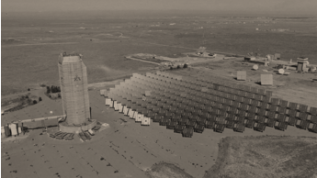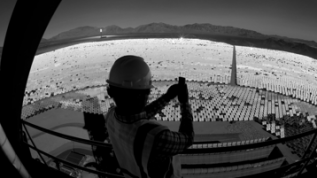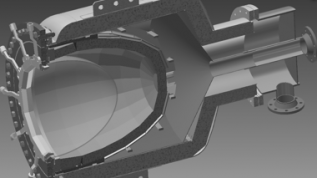Solar Thermal Energy Laboratory - Research
Solar Receivers
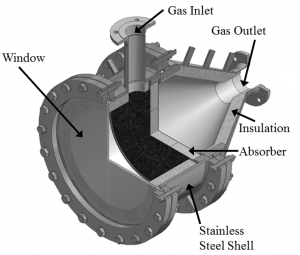 It is only possible to use solar energy for thermal processes if the radiation is captured efficiently. Our group is focused on finding new designs and improving performance of solar energy receivers through thermal analysis, heat transfer modeling, and new materials. Prototypes built in our laboratory let us investigate new designs and solve practical challenges.
It is only possible to use solar energy for thermal processes if the radiation is captured efficiently. Our group is focused on finding new designs and improving performance of solar energy receivers through thermal analysis, heat transfer modeling, and new materials. Prototypes built in our laboratory let us investigate new designs and solve practical challenges.
Thermal Device Design
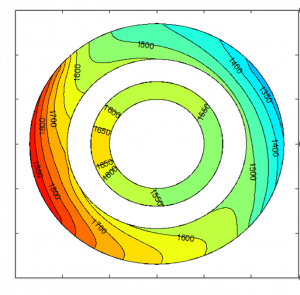 Our research into advanced heat transfer and thermal device design extends beyond just solar energy. Many devices exist for high-temperature industrial processes, including reactors, heat exchangers, thermal storage systems, and more. Through detailed modeling and analysis, we seek to improve the performance of these devices. We investigate the use of new materials and high efficiency modes of heat transfer, like phase change and thermochemical, to improve existing devices and create new applications in the high temperature process space.
Our research into advanced heat transfer and thermal device design extends beyond just solar energy. Many devices exist for high-temperature industrial processes, including reactors, heat exchangers, thermal storage systems, and more. Through detailed modeling and analysis, we seek to improve the performance of these devices. We investigate the use of new materials and high efficiency modes of heat transfer, like phase change and thermochemical, to improve existing devices and create new applications in the high temperature process space.
Solar Thermochemistry
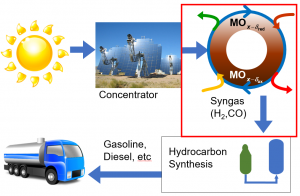 An exciting application of solar thermal energy is to provide process heat for a variety of very-high-temperature chemical reactions. By operating these reactions at very high temperatures using concentrated sunlight, very high theoretical efficiencies are possible. The challenge is to design the process and the reactor to reliably run the cycle in the extreme conditions necessary. Our group seeks new chemical processes, like ones for cement, fertilizer, and fuel production and develops ways to implement these processes powered by solar energy. We focus on brainstorming new reactor and plant designs, modeling and designing the devices, and testing prototypes. Along the way, we apply fundamental heat transfer and thermodynamics knowledge to arrive at efficient designs.
An exciting application of solar thermal energy is to provide process heat for a variety of very-high-temperature chemical reactions. By operating these reactions at very high temperatures using concentrated sunlight, very high theoretical efficiencies are possible. The challenge is to design the process and the reactor to reliably run the cycle in the extreme conditions necessary. Our group seeks new chemical processes, like ones for cement, fertilizer, and fuel production and develops ways to implement these processes powered by solar energy. We focus on brainstorming new reactor and plant designs, modeling and designing the devices, and testing prototypes. Along the way, we apply fundamental heat transfer and thermodynamics knowledge to arrive at efficient designs.
Radiation Heat Transfer
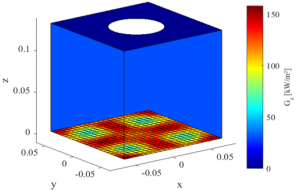
The analysis of radiation heat transfer is fundamental to solar energy and any high temperature system. Within our group, we develop and use methods for modeling and analyzing the transfer of heat by radiation. This includes the evaluation and improvement of advanced modeling techniques based on Monte Carlo ray tracing or finite difference methods. Finding ways to include radiation in a simulation with fluid mechanics and other forms of heat transfer is an ongoing area of research, one that can make it easier to build simulations of complex, large-scale device.

